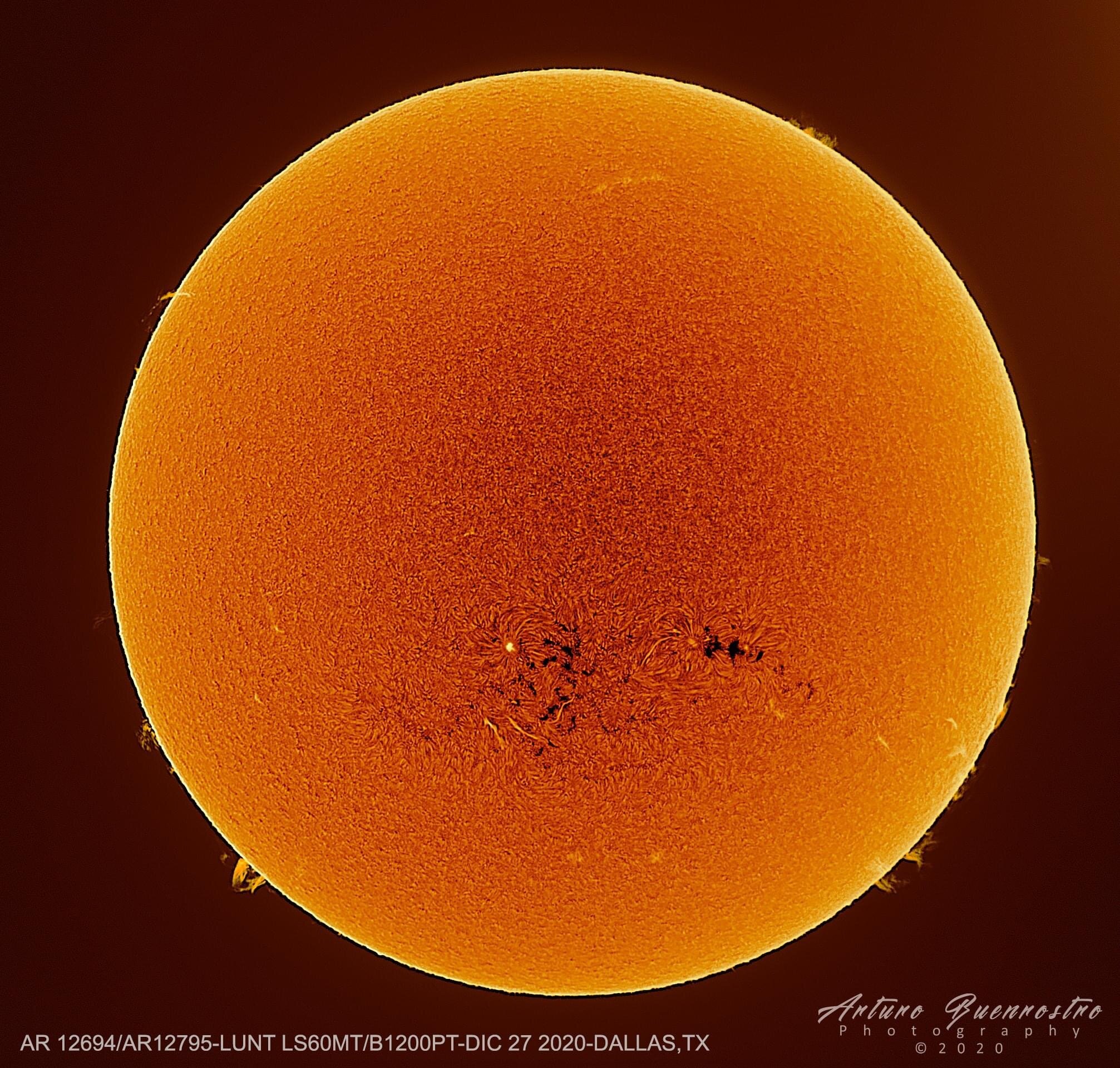
AAPOD2 Image Archives
Solar
Featured Astrophotographer on AAPOD2
Coronal Loops in Hα – A Season of Solar Sculptures
This striking four-panel composite captures dynamic coronal loops seen on the edge of the Sun in hydrogen-alpha (Hα) light. These arching structures are vast magnetic fields channeling superheated plasma, each loop tracing the complex choreography of solar magnetism. Taken during the 2024–25 season from a private observatory in Mantova, the compilation showcases the Sun’s vibrant and ever-changing limb in exquisite detail.
Coronal loops are key features in solar activity and often precede or accompany solar flares. Each image freezes a moment in the Sun’s turbulent outer atmosphere, revealing plasma flows that span tens of thousands of kilometers. The fine structure of the chromosphere below adds rich context to these glowing arches, emphasizing the beauty and violence of our closest star.
The Plasma Dance
This image of the Sun captures its current solar maximum phase, showcasing the dynamic and intense activity on its surface. The image was created by combining six days of solar prominence limb activity observed over the past two months. These prominences, which appear as bright loops and arches extending from the Sun's surface, are caused by the Sun's magnetic field and are particularly active during the solar maximum.
During a solar maximum, the Sun's magnetic field is at its strongest, leading to an increase in sunspots, solar flares, and prominences. This period of heightened activity, occurring roughly every 11 years, has a significant impact on space weather and can even affect satellite communications and power grids on Earth. This composite image provides a vivid representation of the Sun's dynamic behavior during this peak period, offering a stunning glimpse into the powerful forces at work on our closest star.
Solar disk movement
In this dual-image sequence captured through TS 80 ED F/7, Lunt 1.25" Solar wedge, Baader Solar Continuum, Baader UV/IR Cut, used to observe the discernible movement of the solar disk over a span of two days. The first image serves as a celestial timestamp, capturing the solar features at the beginning of this brief period, while the second image, taken 48 hours later, provides a snapshot of the Sun's altered landscape. Notable shifts in sunspot positions and prominence activities become apparent, offering a tangible illustration of the Sun's rotational dynamics. This observational study not only showcases the immediate changes on the solar surface but also presents an opportunity for solar physicists to analyze the Sun's rotational patterns and magnetic field evolution within this concise timeframe
Small sunspots, large filaments (WL vs Ha)
In this composite view of the Sun, the image on the left, taken using a white light filter, provides a detailed look at the visible surface, or photosphere, revealing granular structures and sunspots that mark regions of complex magnetic activity. Sunspots are cooler areas created by strong magnetic fields inhibiting the transport of heat from the solar interior, appearing as dark blemishes on the solar surface.
On the right, the image captured with a Hydrogen-Alpha (Hα) filter unveils the chromosphere's dynamic features, showcasing solar prominences that tower over the Sun's limb. These prominences, composed of cooler plasma suspended in magnetic loops, offer a captivating glimpse into the intricate magnetic phenomena occurring on the solar surface.
Solar prominences can erupt in dramatic events known as solar flares, releasing intense bursts of energy and charged particles into space. These flares, often accompanied by coronal mass ejections (CMEs), can have significant impacts on our space environment, potentially affecting satellite operations and terrestrial communication systems.
THE SUN FROM TEXAS
Solar photography is both art and science, capturing stunning images of the Sun, like in this wonderful example, allows photographers and astronomers to document solar phenomena such as sunspots, solar flares, and the ethereal beauty of nearest star.
Sparkles in the Sun
Image Description and Details :
Solar Activity on October 25, 2887,2890, 2886, I was able to capture the large bulge that was had that day, M1.3 class flashes, we are still in the solar shekel number 25, which according to estimates, could last much less than expected , due to the great activity that has been seen, and that was ahead of the forecasts, for now to enjoy these spectacular solar landscapes, at every moment the sun gives us a different view, to capture it!
Copyright: Arturo Buenrostro
The Journey of AR12794-2795
Image Description and Details :
This image is a blend of 9 images taken on 9 days from 25.12.2020 to 02.01.2021. This shows how the sunspot AR12794 and AR12795 moves along the solsr disk due to Sun’s rotation. Also noticable is the change in thr apparent size of the sunspots where AR12795 ultimately becomes a faculae. The photo was taken with Nikon D5600, Sigma 150-600c and Thousand Oaks Solar Filter (white light). Post-processed via PIPP, Adobe Camera Raw and Photoshop.
Copyright: Soumyadeep Mukherjee
The Sun between veils and clouds
Coronado Solarmax 3 Double Stack
Asi Zwo 178 MM
Copyright: Claudio Ciceri
Sun from Dallas
AR 12794 and AR12795, 12/27/2020ZWO 178MMLunt 60MT/B1200 AlphaLunt 80mm engineering calcium k/B1200Processed in PIPP, deepskystacker, registax, photoshop.
Copyright Information: Arturo Buenrostro
Sun’s Green Flash & Yacht
Image Description and Details :
Canon 60DWilliam Optics Zenithstar 70EDTripodeExp: 1/500sIso: 100LrGuillermo Cervantes MosquedaObservatorio Astronómico AltaïrPoncitlán Jalisco México
Copyright Information: Guillermo Cervantes Mosqueda
Photosphere and Solar Chromosphere
Image Description and Details:
Photosphere: Meade 60mm ZWO ASI120MM Herschel Prism + Baader Solar Continuum + Optolong UV / IR + ND # 3 Nexstar mount 1000 frames Chromosphere: Crowned PST ZWO ASI120MM Nexstar mount 1000 Frames in Under Exposure and Over Exposure Software: Firecapture + Autostakkert + Registax + Fitsworks + Ps Guillermo Cervantes Mosqueda Altaír Astronomical Observatory Poncitlán Jalisco Mexico
Copyright Information: Guillermo Cervantes Mosqueda
Solar Eruption
LUNT LS100THa PT (Single Stack) / B1800 / Barlow 3X / DMK31AU03
LucamRecorder-AutoStakkert!2-ImPPG-PS5
Copyright: Peter Desypris














